 (source)
(source)
|
Sir Charles Lyell
(14 Nov 1797 - 22 Feb 1875)
Scottish geologist who promoted concepts of gradualism to replace the prevailing ideas of catastrophism. Lyell maintained that the Earth's features were, in fact, produced by continuing, gradual effects of natural forces.
|
Science Quotes by Sir Charles Lyell (34 quotes)
>> Click for Sir Charles Lyell Quotes on | Geology | Science | Species |
>> Click for Sir Charles Lyell Quotes on | Geology | Science | Species |
“Time’s noblest offspring is the last.” This line of Bishop Berkeley’s expresses the real cause of the belief in progress in the animal creation.
— Sir Charles Lyell
Leonard G. Wilson (ed.), Sir Charles Lyell’s Scientific Journals on the Species Question (1970), 162.
[My Book] will endeavour to establish the principle[s] of reasoning in ... [geology]; and all my geology will come in as illustration of my views of those principles, and as evidence strengthening the system necessarily arising out of the admission of such principles, which... are neither more nor less than that no causes whatever have from the earliest time to which we can look back, to the present, ever acted, but those now acting; and that they never acted with different degrees of energy from that which they now exert.
— Sir Charles Lyell
Letter to Roderick Murchison Esq. (15 Jan 1829). In Mrs Lyell (ed.), The Life, Letters and Journals of Sir Charles Lyell, Bart (1881), Vol. 1, 234.
Although we are mere sojourners on the surface of the planet, chained to a mere point in space, enduring but for a moment of time, the human mind is not only enabled to number worlds beyond the unassisted ken of mortal eye, but to trace the events of indefinite ages before the creation of our race, and is not even withheld from penetrating into the dark secrets of the ocean, or the interior of the solid globe; free, like the spirit which the poet described as animating the universe.
— Sir Charles Lyell
In Principles of Geology (1830).
Amidst the vicissitudes of the earth’s surface, species cannot be immortal, but must perish, one after another, like the individuals which compose them. There is no possibility of escaping from this conclusion.
— Sir Charles Lyell
Principles of Geology (1837), Vol. 2, 202.
As geologists, we learn that it is not only the present condition of the globe that has been suited to the accommodation of myriads of living creatures, but that many former states also have been equally adapted to the organization and habits of prior races of beings. The disposition of the seas, continents, and islands, and the climates have varied; so it appears that the species have been changed, and yet they have all been so modelled, on types analogous to those of existing plants and animals, as to indicate throughout a perfect harmony of design and unity of purpose. To assume that the evidence of the beginning or end of so vast a scheme lies within the reach of our philosophical inquiries, or even of our speculations, appears to us inconsistent with a just estimate of the relations which subsist between the finite powers of man and the attributes of an Infinite and Eternal Being.
— Sir Charles Lyell
Concluding remark, Principles of Geology(1833), Vol. 3, 384-5.
Each species may have had its origin in a single pair, or individual, where an individual was sufficient, and species may have been created in succession at such times and in such places as to enable them to multiply and endure for an appointed period, and occupy an appointed space on the globe.
— Sir Charles Lyell
Principles of Geology(1830-3), Vol. 2, 124.
Etna presents us not merely with an image of the power of subterranean heat, but a record also of the vast period of time during which that power has been exerted. A majestic mountain has been produced by volcanic action, yet the time of which the volcanic forms the register, however vast, is found by the geologist to be of inconsiderable amount, even in the modern annals of the earth’s history. In like manner, the Falls of Niagara teach us not merely to appreciate the power of moving water, but furnish us at the same time with data for estimating the enormous lapse of ages during which that force has operated. A deep and long ravine has been excavated, and the river has required ages to accomplish the task, yet the same region affords evidence that the sum of these ages is as nothing, and as the work of yesterday, when compared to the antecedent periods, of which there are monuments in the same district.
— Sir Charles Lyell
Travels in North America (1845), Vol. 1, 28-9.
Geology differs as widely from cosmogony, as speculations concerning the creation of man differ from history.
— Sir Charles Lyell
Principles of Geology (1830-3), Vol. 1, 4.
Geology is intimately related to almost all the physical sciences, as is history to the moral. An historian should, if possible, be at once profoundly acquainted with ethics, politics, jurisprudence, the military art, theology; in a word, with all branches of knowledge, whereby any insight into human affairs, or into the moral and intellectual nature of man, can be obtained. It would be no less desirable that a geologist should be well versed in chemistry, natural philosophy, mineralogy, zoology, comparative anatomy, botany; in short, in every science relating to organic and inorganic nature. With these accomplishments the historian and geologist would rarely fail to draw correct and philosophical conclusions from the various monuments transmitted to them of former occurrences.
— Sir Charles Lyell
Principles of Geology (1830-3), Vol. 1, 2-3.
Geology is the science which investigates the successive changes that have taken place in the organic and inorganic kingdoms of nature; it enquires into the causes of these changes, and the influence which they have exerted in modifying the surface and external structure of our planet.
— Sir Charles Lyell
Principles of Geology (1830-3), Vol. 1, 1.
Go and see.
— Sir Charles Lyell
Given by author Thomas George Bonney as a maxim always guiding Lyell’s work. In Charles Lyell and Modern Geology (1895), 213. See another quote on this web page and compare Lyell’s own words: “We must preach up travelling … as the first, second, and third requisites for a modern geologist…”.
Hitherto, no rival hypothesis has been proposed as a substitute for the doctrine of transmutation; for 'independent creation,' as it is often termed, or the direct intervention of the Supreme Cause, must simply be considered as an avowal that we deem the question to lie beyond the domain of science.
— Sir Charles Lyell
The Antiquity of Man (1863), 421.
However much we may enlarge our ideas of the time which has elapsed since the Niagara first began to drain the waters of the upper lakes, we have seen that this period was one only of a series, all belonging to the present zoological epoch; or that in which the living testaceous fauna, whether freshwater or marine, had already come into being. If such events can take place while the zoology of the earth remains almost stationary and unaltered, what ages may not be comprehended in those successive tertiary periods during which the Flora and Fauna of the globe have been almost entirely changed. Yet how subordinate a place in the long calendar of geological chronology do the successive tertiary periods themselves occupy! How much more enormous a duration must we assign to many antecedent revolutions of the earth and its inhabitants! No analogy can be found in the natural world to the immense scale of these divisions of past time, unless we contemplate the celestial spaces which have been measured by the astronomer.
— Sir Charles Lyell
Travels in North America (1845), Vol. 1, 51-2.
I conceive that Lamarck was the first to bring it forward systematically & to 'go the whole orang' ... Yet evolutionists 'cannot be pooh-poohed & ought not to be so.'
— Sir Charles Lyell
Letter to Huxley (17 Jun 1859), Imperial College Archives, Huxley Papers, 6:20. Partly reprinted in Leonard G. Wilsou (ed.), Sir Charles Lyell's Scientific Journals on the Species Question (1970), 314. Lyell expressed the same remark to Darwin in 1863 (The Correspondence of Charles Darwin (1999), Vol. 11, 231.)
I may conclude this chapter by quoting a saying of Professor Agassiz, that whenever a new and startling fact is brought to light in science, people first say, 'it is not true,' then that 'it is contrary to religion,' and lastly, 'that everybody knew it before.'
— Sir Charles Lyell
The Antiquity of Man (1863), 105.
In attempting to explain geological phenomena, the bias has always been on the wrong side; there has always been a disposition to reason á priori on the extraordinary violence and suddenness of changes, both in the inorganic crust of the earth, and in organic types, instead of attempting strenuously to frame theories in accordance with the ordinary operations of nature.
— Sir Charles Lyell
Letter to Rev. W. Whewell (7 Mar 1837). Quoted in Mrs Lyell (ed.), Life, Letters and Journals of Sir Charles Lyell, Bart (1881), Vol. 2, 3.
In the course of this short tour, I became convinced that we must turn to the New World if we wish to see in perfection the oldest monuments of the earth’s history, so far at least as relates to its earliest inhabitants.
— Sir Charles Lyell
Travels in North America (1845), Vol. 1, 19.
It must have appeared almost as improbable to the earlier geologists, that the laws of earthquakes should one day throw light on the origin of mountains, as it must to the first astronomers, that the fall of an apple should assist in explaining the motions of the moon.
— Sir Charles Lyell
Principles of Geology(1830-3), Vol. 3, 5.
It was a profound saying of Wilhelm Humboldt, that 'Man is man only by means of speech, but in order to invent speech he must be already man.'
— Sir Charles Lyell
The Antiquity of Man (1863), 468.
Man, whose organization is regarded as the highest, departs from the vertebrate archetype; and it is because the study of anatomy is usually commenced from, and often confined to, his structure, that a knowledge of the archetype has been so long hidden from anatomists.
— Sir Charles Lyell
'The Lexington Papers', The Quarterly Review (1851), 89, 450-1.
Millions of our race are now supported by lands situated where deep seas once prevailed in earlier ages. In many districts not yet occupied by man, land animals and forests now abound where the anchor once sank into the oozy bottom.
— Sir Charles Lyell
Principles of Geology (1837), Vol. 1, 237.
Never was there a dogma more calculated to foster indolence, and to blunt the keen edge of curiosity, than ... [the] assumption of the discordance between the former and the existing causes of change.
— Sir Charles Lyell
Principles of Geology(1830-3), Vol. 3, 2-3.
Notwithstanding, therefore, that we have not witnessed of a large continent, yet, as we may predict the future occurrence of such catastrophes, we are authorized to regard them as part of the present order of Nature.
— Sir Charles Lyell
Principles of Geology (1837), Vol. 1, 94.
One of Darwin’s reviewers put the alternative strongly by asking “whether we are to believe that man is modified mud or modified monkey”.
— Sir Charles Lyell
In Letter to Thomas S. Spedding (19 May 1863), Life, Letters and Journals of Sir Charles Lyell (1881), Vol. 2, 376. [The mud is a reference to the Bible’s description in Genesis (2:7) that God formed man of the dust of the ground.]
Prefer reason to authority.
— Sir Charles Lyell
Given by author Thomas George Bonney as a maxim always guiding Lyell’s work. In Charles Lyell and Modern Geology (1895), 213.
Probably there was a beginning—it is a metaphysical question, worthy a theologian—species have begun and ended—but the analogy is faint and distant.
— Sir Charles Lyell
Letter to [George] Poulett Scrape (14 Jun 1830). Quoted in Mrs Lyell (ed.), Life, Letters and Journals of Sir Charles Lyell, Bart (1881), Vol. 1, 269.
So far from having a materialistic tendency, the supposed introduction into the earth at successive geological periods of life,—sensation,—instinct,—the intelligence of the higher mammalia bordering on reason,—and lastly the improvable reason of Man himself, presents us with a picture of the ever-increasing dominion of mind over matter.
— Sir Charles Lyell
The Antiquity of Man (1863), 506.
The earth’s becoming at a particular period the residence of human beings, was an era in the moral, not in the physical world, that our study and contemplation of the earth, and the laws which govern its animate productions, ought no more to be considered in the light of a disturbance or deviation from the system, than the discovery of the satellites of Jupiter should be regarded as a physical event in the history of those heavenly bodies, however influential they may have become from that time in advancing the progress of sound philosophy among men.
— Sir Charles Lyell
In Principles of Geology, Being an Attempt to Explain the Former Changes of the of the Earth’s Surface, by Reference to Causes Now in Operation(1830), Vol. 1, 163.
The ordinary naturalist is not sufficiently aware that when dogmatizing on what species are, he is grappling with the whole question of the organic world & its connection with the time past & with Man; that it involves the question of Man & his relation to the brutes, of instinct, intelligence & reason, of Creation, transmutation & progressive improvement or development. Each set of geological questions & of ethnological & zool. & botan. are parts of the great problem which is always assuming a new aspect.
— Sir Charles Lyell
Leonard G. Wilson (ed.), Sir Charles Lyell's Scientific Journals on the Species Question (1970), 164.
The question now at issue, whether the living species are connected with the extinct by a common bond of descent, will best be cleared up by devoting ourselves to the study of the actual state of the living world, and to those monuments of the past in which the relics of the animate creation of former ages are best preserved and least mutilated by the hand of time.
— Sir Charles Lyell
The Antiquity of Man (1863), 470.
There is no foundation in geological facts, for the popular theory of the successive development of the animal and vegetable world, from the simplest to the most perfect forms.
— Sir Charles Lyell
Principles of Geology (1830-3), Vol. 1, 153.
We might expect … in the summer of the “great year,” which we are now considering, that there would be a great predominance of tree-ferns and plants allied to the palms and arborescent grasses in the isles of the wide ocean, while the dicotyledenous plants and other forms now most common in temperate regions would almost disappear from the earth. Then might these genera of animals return, of which the memorials are preserved in the ancient rocks of our continents. The huge iguanodon might reappear in the woods, and the ichthyosaur in the sea, while the pterodactyle might flit again through umbrageous groves of tree-ferns. Coral reefs might be prolonged beyond the arctic circle, where the whale and narwal [sic] now abound. Turtles might deposit their eggs in the sand of the sea beach, where now the walrus sleeps, and where the seal is drifted on the ice-floe.
— Sir Charles Lyell
In Principles of Geology (1830-3), Vol. 1, 123.
We must preach up traveling … as the first, second, and third requisites for a modern geologist, in the present adolescent stage of the science.
— Sir Charles Lyell
Letter (12 Jan 1829) to Roderick Murchison, collected in Katherine Murray Lyell (ed.), Life, Letters and Journals of Sir Charles Lyell, Bart. (1881), Vol. 1, 233-234.
When the aggregate amount of solid matter transported by rivers in a given number of centuries from a large continent, shall be reduced to arithmetical computation, the result will appear most astonishing to those...not in the habit of reflecting how many of the mightiest of operations in nature are effected insensibly, without noise or disorder.
— Sir Charles Lyell
Principles of Geology (1837), Vol. 1, 230.
Quotes by others about Sir Charles Lyell (8)
Mr. Lyell’s system of geology is just half the truth, and no more. He affirms a great deal that is true, and he denies a great deal which is equally true; which is the general characteristic of all systems not embracing the whole truth. .
29 June 1833. Table Talk (1836). In The Collected Works of Samuel Taylor Coleridge: Table Talk (1990), Vol. 14, 2, Carl Woodring (ed.), 235.
I always feel as if my books came half out of Lyell's brain... & therefore that when seeing a thing never seen by Lyell, one yet saw it partially through his eyes.
Letter to Leonard Horner, 29 August 1844. In F. Burkhardt and S. Smith (eds.), The Correspondence of Charles Darwin 1844-1846 (1987), Vol. 3, 55.
Your words have come true with a vengeance that I shd [should] be forestalled ... I never saw a more striking coincidence. If Wallace had my M.S. sketch written out in 1842 he could not have made a better short abstract! Even his terms now stand as Heads of my Chapters.
Letter to Charles Lyell, 18 June 1858. In F. Burkhardt and S. Smith (eds.), The Correspondence of Charles Darwin 1858-1859, Supplement 1821-1857 (1991), Vol. 7, 107.
For books [Charles Darwin] had no respect, but merely considered them as tools to be worked with. … he would cut a heavy book in half, to make it more convenient to hold. He used to boast that he had made Lyell publish the second edition of one of his books in two volumes, instead of in one, by telling him how ho had been obliged to cut it in half. … his library was not ornamental, but was striking from being so evidently a working collection of books.
In Charles Darwin: His Life Told in an Autobiographical Chapter, and in a Selected Series of his Published Letters (1908), 96.
The frontispiece of Mr. Lyell's book is enough to throw a Wernerian into fits.
Review of Murchison's Silurian System, Quarterly Review (1839), 64, 112.
We cannot see how the evidence afforded by the unquestioned progressive development of organised existence—crowned as it has been by the recent creation of the earth's greatest wonder, MAN, can be set aside, or its seemingly necessary result withheld for a moment. When Mr. Lyell finds, as a witty friend lately reported that there had been found, a silver-spoon in grauwacke, or a locomotive engine in mica-schist, then, but not sooner, shall we enrol ourselves disciples of the Cyclical Theory of Geological formations.
Review of Murchison's Silurian System, Quarterly Review (1839), 64, 112-3.
We may be sure, that if Lyell were now living he would frankly recognize new facts, as soon as they were established, and would not shrink from any modification of his theory which these might demand. Great as were his services to geology, this, perhaps, is even greater—for the lesson applies to all sciences and to all seekers alter knowledge—that his career, from first to lost, was the manifestation of a judicial mind, of a noble spirit, raised far above all party passions and petty considerations, of an intellect great in itself, but greater still in its grand humility; that he was a man to whom truth was as the “pearl of price,” worthy of the devotion and, if need be, the sacrifice of a life.
Conclusion in Charles Lyell and Modern Geology (1895), 213.
The science of geology is enormously indebted to Lyell—more so, as I believe, than to any other man who has lived.
In Charles Darwin and Francis Darwin, The Life and Letters of Charles Darwin (1888), Vol. 1, 72.
See also:
- 14 Nov - short biography, births, deaths and events on date of Lyell's birth.
- Principles of Geology, by Charles Lyell. - book suggestion.
- Booklist for Charles Lyell.
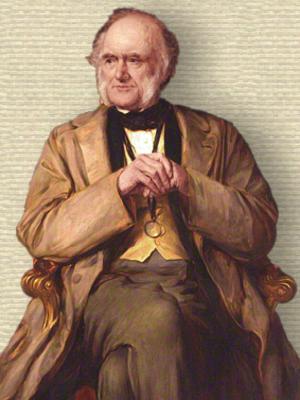
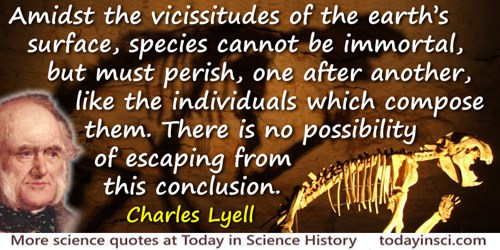
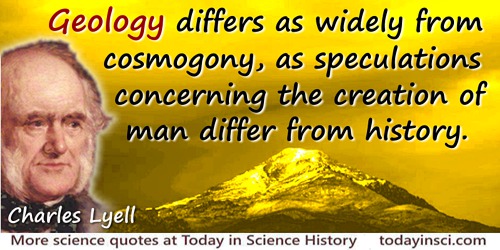

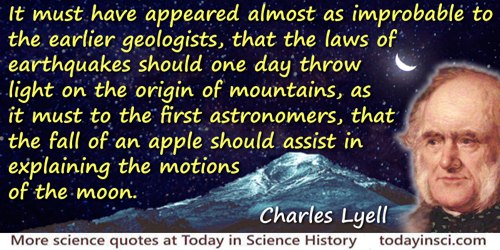


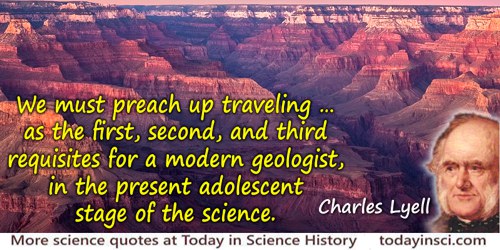

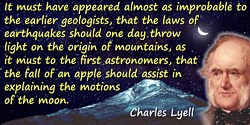
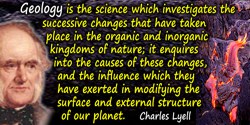
 In science it often happens that scientists say, 'You know that's a really good argument; my position is mistaken,' and then they would actually change their minds and you never hear that old view from them again. They really do it. It doesn't happen as often as it should, because scientists are human and change is sometimes painful. But it happens every day. I cannot recall the last time something like that happened in politics or religion.
(1987) --
In science it often happens that scientists say, 'You know that's a really good argument; my position is mistaken,' and then they would actually change their minds and you never hear that old view from them again. They really do it. It doesn't happen as often as it should, because scientists are human and change is sometimes painful. But it happens every day. I cannot recall the last time something like that happened in politics or religion.
(1987) -- 


